China Olympics blog
A daily blog following key political stories in China during the Beijing Olympics
Thursday, 21 August 2008, 3:30pm 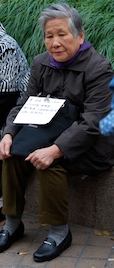
It would be nice to occasionally highlight positive stories about the Chinese authorities in this blog, but it is difficult to do so when they threaten to send blind, crippled women in their 70s to labour camps. A story widely reported yesterday highlighted the plight of one of the 77 groups that had sought permission to demonstrate in the official protest parks during the Olympics.
When Chinese friends and colleagues accuse the West (or me) of being unfair to China, or of not understanding its “special circumstances”, these are the sorts of examples we should point to – behaviour that is simply indefensible. These Olympics have been hosted on China’s terms. The IOC has its charter and requirements that it tries to impose on every host, but it is a spineless organisation that has been easily resisted by China (more on this another time). The protest parks that China set up were a sop to show that it was doing something for the Olympics on human rights. The Chinese police controlled the parks, who would be allowed to protest and on what issues. And the result? Absolutely no protests at all, an official statement that all of the applications had been withdrawn “after amicable settlements between the parties and authorities” or had failed on technical grounds, and stories like this one of applicants being arrested or threatened with severe punishment.
A second story of gratuitous over-reaction to surface today is that the Chinese authorities have blocked access to the iTunes store in the mainland after athletes downloaded songs sympathetic to Tibet. This one doesn’t really hurt anyone, but it is your classic authoritarian knee-jerk reaction. Has the Chinese government learnt nothing from recent history? Whilst the sixties was something entirely different in China, surely they must have noticed what was taking place at college campuses across the US and rest of the world?
If it wasn’t so tragic, the Chinese government’s response to all of this would be laughable. Instead it is infuriating and just sad that those in power in China remain terrified of any dissent or threat to their authority.
[photo by John Fox]
—————————————————————
Tuesday, 19 August 2008, 3:30pm 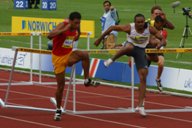
One of your Olympics stars being struck down by a foot injury is bad luck. But your two biggest Olympics stars being struck down by foot injuries smacks of conspiracy – at least in China.
Chinese hurdler Liu Xiang’s withdrawal yesterday from the 110m hurdles qualifiers has sparked a huge emotional response in China. Liu was by far the most popular Chinese competitor at these Olympics – the one the people really wanted to see win. Liu’s coach and father both broke down in tears whilst speaking to the media at various points yesterday. The response in the stadium as Liu hobbled off was one of shock and sorrow. But, more uniquely to China, there have also been reactions of anger and accusations of a conspiracy to save face for Liu, his sponsors or China’s leaders.
You can see the frustration on the message boards. Young Chinese that had worked themselves up into a frenzy about Liu winning are now accusing him of cowardice for not at least starting the race (even if he had to pull up), and of letting China down. There are accusations of deception, aimed at Liu, his coach and the Chinese sporting establishment for not keeping the public informed about Liu’s condition or the possibility of him being unable to compete. Some have assumed a conspiracy, arguing that someone in the hierarchy had decided that Liu wasn’t fit enough to win and it would be better for him to therefore pull out with an “injury” to save face all round. There has even been a blog from a supposed insider claiming that the withdrawal was engineered by the US sports company Nike who sponsor Liu and wanted to protect their brand.
There are conspiracy rumours from internet crackpots the world over. But the sheer level of emotion around Liu’s withdrawal betrays the pent up anger at issues surrounding national pride in China. The Chinese government finds itself in the firing line this time having associated itself so closely with Liu. Government internet censors are apparently removing critical posts about Liu from message boards. Now if only China’s leaders would do something about the “patriotic” education system which hammers nationalism into Chinese children in the first place.
[photo by James Godber]
——————————————————
Monday, 18 August 2008, 5:00pm
One of the later deceptions to come out about the Olympics opening ceremony was that some or all of the 55 Chinese ethnic minority children that appeared were not in fact ethnic minorities, but Han Chinese in costume. Web chatter points out that this is not unusual in China, with Han children often dressing up as one of their national minority siblings for school events or national day.
China’s narrative about its 56 nationalities (Han Chinese and 55 officially recognised minorities) is enshrined in its constitution and is integral to the very nature of the modern Chinese state. For a nationalistic, authoritarian country, it is often surprising that China places such emphasis on its minorities. Until recently, China’s currency featured profiles of different ethnic minorities on each denomination of note (now replaced by the omnipresent portrait of Chairman Mao). It has almost seemed as though the existence of the Chinese state depended on convincing the people that there was some pre-ordained bond linking the various ethnicities together. Given that at the time of the formation of the People’s Republic, Han Chinese made up 96-97% of the population and it is their language and culture that dominate, it seems almost unnecessary to have gone to such lengths when the country was struggling to survive. But China’s leaders, Communists or not, are deeply affected by history and whilst trying to overthrow the injustice of rule by emperor, cannot get out of their heads the idea of China as an empire which rules over tributary states. So as easy as it would be to ignore or exclude minority groups, China’s leaders give them a special place in the empire. Of course all this also has much to do with the fact that several of the minority groups lay claim to vast tracts of land that together make up more than half of the total area of China.
But does this special place benefit China’s national minorities? Somewhere between respecting minorities and patronising them there is a line. For me, dressing children up in national costume they don’t belong to and parading them around in a ceremony falls the wrong side of that line. As unfortunately does most official rhetoric towards China’s national minorities. There is something deeply unsettling about the National Minorities Park in Beijing (made famous last week by Tibet protestors) with its kitsch mock villages and performances by employees in costume (again probably Han) singing “we love our China”. Unfortunately the Chinese authorities removed the badly translated English traffic sign outside the gate which used to direct people into “Racist Park”. The attitude of China’s leaders is also made clear at the annual sessions of the National People’s Congress where they congratulate delegates from national minorities who have staggered in their obligatory full regalia for the “colour they bring to the proceedings” (rather than because of any policy input they might make). Similarly I will never forget being introduced to a Senior Fellow at the Foreign Affairs University in Beijing who I was told by the Vice-President was “Tibetan and could therefore sing and dance for us”! I hope I am never introduced as a Senior Fellow from Yorkshire that could advise you how to save a few quid.
There are many serious problems with China’s treatment of its minorities – not just in Tibet and Xinjiang. China’s rapid modernisation is seeing it face the problems the US and much of Europe has for decades about equal opportunities and disenfranchisement across the country. Until China stops thinking of its minorities as a novelty, it is never going to be able to tackle the more serious issues that affect them.
———————————————————–
Friday, 15 August 2008, 1:00pm
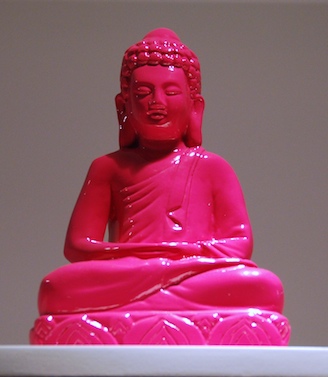
The almost daily arrest of foreign protestors continued today with several “Students for a Free Tibet” detained for unfurling a banner in front of the China Central Television (CCTV) building. So why always Tibet?
Tibet is certainly a cause célèbre. It is importantly also an issue backed by numerous well-funded campaign and activist groups (which is probably the most straightforward answer to my question). But is it really the most serious offence against our moral sensibilities taking place in China? The one which we should pour all our efforts into highlighting?
Western governments don’t appear to think so. Whilst the dilemma of whether or not to meet the Dalai Lama will always occupy governments’ time, very few otherwise expend much effort pressuring China on Tibet. EU, US and other human rights dialogues with China focus more on the death penalty, reform through labour, torture, freedom of speech and worship and other offences which arguably affect a far wider group of people than oppression in Tibet. I have argued that the situation in Xinjiang is arguably worse, and the people opposing Chinese rule in the region are a more serious security threat. Lets not forget that China has over 1000 missiles pointing at Taiwan and the ever-present threat of attack if the island does something the mainland objects to.
And what about corruption and day-to-day mismanagement of social issues across the country? Where are the Chinese protestors that make up the almost 300 incidents of unrest that apparently take place per day across the country? Surely some of them have grievances which merit spontaneous demonstrations given we now know their official applications to protest are being refused?
Whilst the intense spotlight on China and the determination of foreign protestors is welcome pressure on the Chinese government to move forwards with political reform, the one regret is that the focus is so exclusively on Tibet. The idea of independence for Tibet is almost impossible to achieve and arguably not the most desirable outcome. So come on Amnesty, Human Rights Watch, Greenpeace even, give us better representation of the issues at stake here. Your Free Tibet colleagues are stealing the limelight.
[photo by John Fox]
——————————————————–
Thursday, 14 August 2008, 6:20pm 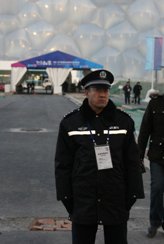
China’s official Olympic spokesman Wang Wei lost his cool at the daily press conference in Beijing today, accusing the international media of coming to China to have a dig. What did he think the media’s job was?
It had to happen sooner or later, but it is not surprising that it did the day after the first international journalist (John Ray of the UK’s ITN) was publicly roughed up and arrested at these Olympics. Many of the questions Wang was peppered with were about the suspicious lack of protestors at any of the designated protest sites around Beijing. And it’s not that no one is applying. The journalists had done their homework and were happy to read out names of Chinese that had applied for permission to protest and had been turned down or arrested.
The Chinese Ministry of Foreign Affairs has to put up with the international media at twice weekly press conferences during more normal times. They too often get attacked by Beijing-based reporters, particularly after some wanton act of violence by a local corrupt official or the police. But the MFA have the comfort of knowing that most of the stories they stonewall questions on will end up buried deep in international sections of newspapers. Beijing-based journalists also tend to expect the stonewalling and therefore either give up quicker, or know to work around it.
But there was something admirable about the bluntness of journalists earlier today repeatedly asking the non-Chinese IOC representative if she was embarrassed by the Chinese Government “lying through its teeth”. Or reading names out to Wang of denied protestors. The Chinese government should know by now that it cannot get away with the pretence that these questions are out of school. Or that if they continually stonewall journalists will give up or get bored. These people have over two more weeks of news to fill and if the Chinese government doesn’t grow up soon and start engaging them properly, the international media will keep pushing and pushing until Wang or more likely the Beijing security forces explode.
[photo by James Godber]
——————————————————————
Wednesday, 13 August 2008, 6:30pm
Chinese fakery is the debate of the day. Op-eds, message boards and discussion groups are surprisingly surprised by a little Chinese girl miming during the opening ceremony and a computer-generated simulation on television of the firework footprints over Beijing. Miming is not out of the ordinary for major ceremonial events, and a simulation seems reasonable given the alternative of a helicopter being blown out of the sky by fireworks. So does the outrage/disappointment reflect wider frustrations over never knowing if anything is real in China?
From the macro level, the assertion that China is a communist county, to the micro level, beer and cigarettes, anything can be fake in China. It can be a frustrating experience living in a country where the question is often not if a product is a fake, but what quality of fake it is. Chinese citizens have long suffered serious consequences from fake drugs and fake food products. How strong is an economy that relies on fake financial information from a news agency that is also the state regulator and bans competitors? Or is built on infrastructure that fakes environmental assessment and energy efficiency reports? Where fake companies trade in fake brands? Or relies on transport links that fake safety and quality standards (is there anything more mad than faking aircraft parts?)? And that’s just the economy.
China is less proficient than Russia at faking democracy. But it is pretty good at faking the rest of the political system. The Chinese constitution sets out a picture that often bears little resemblance to China today. It guarantees rights and freedoms that we take for granted in Europe but are faked at every level of government in China. From the fake idea that Chinese citizens can take their grievances to Beijing (internment camps have been set up outside Beijing to house and send back the thousands that fall for this one), to the fake idea that they will get justice through a legal system which serves to protect the Party. Europeans are tired at being lied to by politicians about healthcare or education – so how do we think Chinese feel about being told black is white whilst their land is being expropriated by corrupt officials?
Perhaps the Olympics were the one thing in China that the government was supposed to do properly, without cutting any corners or faking any sweet smiles. Enthusiasm in the country at hosting the games is genuine. The Chinese government has made an unprecedented effort to try and stamp out fake merchandise and fake tickets. It has even genuinely lifted some controls for foreign journalists (although those too were tested today by an ITN journalist). So why did it think that faking key parts of the opening ceremony would be OK? Sadly because those that made the decisions have got all too used to bending reality to suit their convenience.
—————————————————-
Tuesday, 12 August 2008, 5:00pm
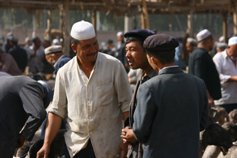 Three Chinese security officials were killed earlier today in the third attack in eight days in Xinjiang in western China. All three attacks have been on Chinese security officials, the first killing 16 Policeman on 4 August, the second one security guard on 10 August. The Chinese Government has blamed the attacks on Uighur “terrorists”, but has not yet identified specific groups.
Three Chinese security officials were killed earlier today in the third attack in eight days in Xinjiang in western China. All three attacks have been on Chinese security officials, the first killing 16 Policeman on 4 August, the second one security guard on 10 August. The Chinese Government has blamed the attacks on Uighur “terrorists”, but has not yet identified specific groups.
Unlike the unrest in Tibet, thesituation in Xinjiang has presented a serious terrorist threat for China for years. The UN, US, UK and others have designated a number of Xinjiang based or linked groups, the most well known one of which is the East Turkestan Islamic Movement (ETIM). But Chinahas secured little support from the West for its policies in Xinjiang or help in tackling what is probably its most serious security threat.
Since joining forces under the Shanghai Cooperation Organisation with Russia and other Central Asian regimes to fight terrorism in the region, China has been vocal about the threat it sees from the “three evils” of “terrorism, separatism and religious extremism”. As elsewhere in the country, the Chinese government does itself no favours by bundling together hard security threats, perceived challenges to its sovereignty and religious rights and freedoms. It is doing a disservice to the people of Xinjiang and the people of China who live under the threat of terrorist attacks. By bundling the issues together, China makes it impossible for the EU, US or others in West to support its position. Chinese officials expend most of their diplomatic efforts trying to prevent the political activities worldwide of groups with no discernable terrorist links, rather than tackling organisations which China and the West can agree are terrorists. Unfortunately the conclusion one must draw is that China is more concerned about maintaining complete political control over the region than the safety and security of its people.
If the EU had a serious, strategic relationship with China,it would do more both to help China tackle this terrorist threat and to force the government to distinguish between it and the legitimate political grievances and aspirations of people in the region. Xinjiang has never attracted the attention Tibet commands in the West as it has no charismatic leader in exile or links to Hollywood superstars. But the human rights abuses by the Chinese government in the region are as bad if not worse than in Tibet. If EU leaders want to help quell the terrorist threat, they must give Uighur, Eastern Turkistan and other Xinjiang-linked groups the hope that there is an alternative to terrorist attacks – that political means and dialogues are worth the effort and will get real support.
[photo by James Godber]
——————————————————
Monday, 11 August 2008, 15:30pm
How will the world remember the opening of the Beijing Olympics? Unfortunately as overshadowed by the Georgia-Russia conflict (see commentary by my colleague Andrew Wilson) if this weekend’s media coverage is any benchmark.
Despite this external competition for attention, and the internal attempts by Xinjiang groups (more on this later in the week) and a nasty stabbing to steal the limelight, China succeeded in putting on the “biggest spectacle in the human race“. The ceremony highlighted official accounts of China’s “5000 years of history” and was watched and cheered on by a billion people (most of whom Chinese). Chinese athletes have also made a strong start, shooting to the top of the medal table. But will China win the propaganda war as the world media’s attention drifts away from the spectacle and starts looking for new stories to report in China?
Controlling the media was always China’s main worry. Security and counter-terrorism dialogues in the run up to the games started with Chinese delegations asking how, in the UK’s case, we planned to control the press in 2012. Despite the recent attacks, the Chinese Government has always felt more comfortable dealing with the hard security threats of domestic terrorism or localised rioting. The Chinese Government finds the international media particularly irritating and disobedient, resorting in most cases to simply ignoring it and blocking it internally. Accusations of bias (which was really just sloppy standards) after the Tibet riots was a sign of the government venting its anger at how the Western media couldn’t see that the Dalai Lama was apparently stringing them along.
The Chinese Government’s problem with the international media is that, like many authoritarian regimes, it refuses to engage with it and as a result doesn’t understand how it works. The Chinese Government is often its own worst enemy, harassing journalists and interviewees, denying access, confiscating media, and relying on rhetoric straight from the cold war. They are then surprised when this becomes the story and Chinais portrayed as an antiquated bully.
The signs of a Chinese propaganda coup over the next three weeks don’t look good. Whilstit is, slowly, learning lessons, has lifted some domestic restrictions on websites and showed restraint in removing Tibet protestors from an overpass – the sight of plain-clothed thugs dragging people out of Tiananmen Square will never look good. With the world’s leaders in Beijing, the opening ceremony, and the excitement of the games still fresh, this weekend probably represented the high point of China-friendly media attention. If it is all down hill from here, then the fireworks have only just begun.
————————————————-
Friday, 8 August 2008, 12:00pm
In the last hours before the Beijing Olympics begin, I thought I would use this first blog entry to comment on what this Olympics should have been about for China and what it should have been about for the rest of the world. Please do comment/ disagree/ expand on thisblog below, I will update it every day and am happy to respond to points. 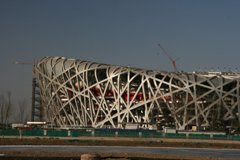
China’s leaders must be wondering if they had made the right decision to bid for the Olympics. To many outside observers, the run up to the Beijing Olympics has provided probably about the expected level of protests, antagonism, riots, bad behaviour by the Chinese Government, fervent nationalist behaviour by the Chinese population. Only the tragic earthquake came asgenuinely unexpected. But at every protest, attack or criticism by foreign leader or celebrity, China’sleaders and its people have reacted as though they have been taken a back bysuch strident attempts to derail its “coming out party”.
Whilst differing expectations between China and the international community depressingly remains part of everyday life, these Olympics have become a high watermark in polar opposite expectations and misunderstanding between the people of Chinaand the rest of the world. With a few high profile exceptions, almost every citizen of Chinaand a good deal of the diaspora are ecstatic about the Olympics. They represent the first time in living memory that China can hold its head up high and bask in the glory of world attention. They are something that Chinese citizens can unashamedly rally around and gives them an edge over the rest of the world, especially the US.This glory is intended to reflect on the Chinese government, or more specifically the Party, which despite its dominance in Chinese society continues to need to demonstrate its legitimacy. The Olympics represents a key stepping stone for Chinain its development. It is a chance to show off its newly rebuilt capital city and its infrastructure and services. For all Chinese concerned these Olympicsare about strengthening China: strengthening the Party’s grip on power, and certainly not a time to experiment with Political reform.
Whilst few foreigners want to deny China its rightful place in the world or its day in the sun, for the rest of the world (well the West really) challenging the status quo was precisely what these Olympics should have been about. The precedent was there in the 1988 Olympics hosted by South Korea,that helped transform the country from China-like authoritarian state to Japan-like democracy (we won’t go into the problems with Japanese democracy here). Through the specific demands placed on China by the IOC and the collected mass of the worlds attention, the outside world was quietly confident that China would have to accelerate political reform, lift media controls, cease its most repugnant behaviour (extensive use of death penalty, reform through labour, torture), and tolerate some form of political opposition and criticism. And if the sheer momentum of the Olympics wasn’t enough, there was of course always the litany of NGOs and campaigners that would hound China in the run up to the games.
And so on the day the Olympics start neither side have realised their expectations. China has of course locked down and tightened many political controls rather than liberalised (this should have been predictable). And the West has done its best to antagonise China to the point of nationalist mobs attacking French shops in China.
Europe’s leaders appear to have given up on any hope of using the Olympics as leverage to change China. President Sarkozy was the only leader brave enough to make a stand after the Tibet riots and it got him and his countrymen ostracised (including by shameless EU colleagues who failed to support him). Since EU leaders have mostly decided to attend the opening (or closing) ceremony, their last chance is to use their presence in Beijing to put some strong political messages to China in private and in public. It is not often nowadays that one encourages EU leaders to follow President Bush’s lead, but he has stood out this week as the only leader willing to make clear to China that the rest of the world isn’t going to celebrate an authoritarian clamp-down.
[photo by James Godber]
The European Council on Foreign Relations does not take collective positions. ECFR publications only represent the views of their individual authors.


